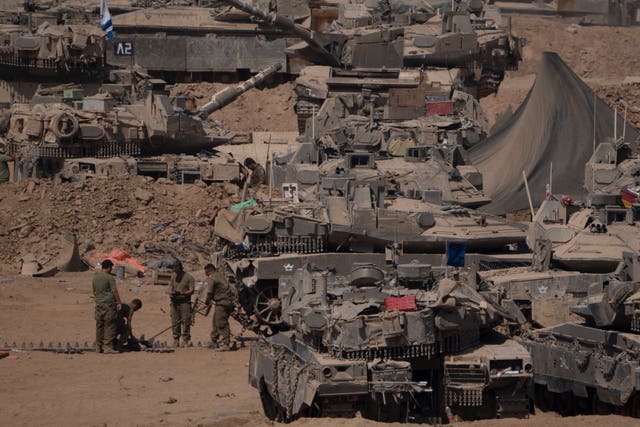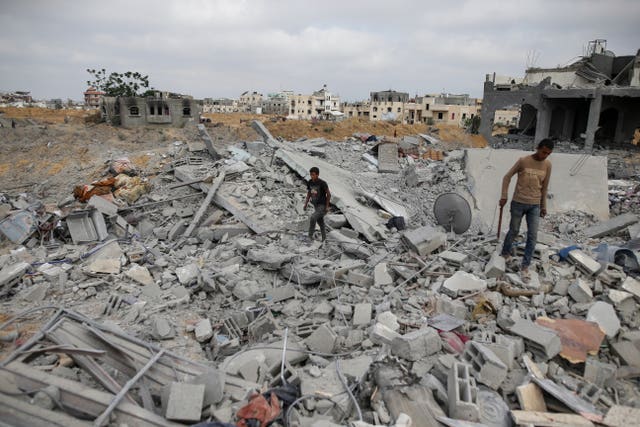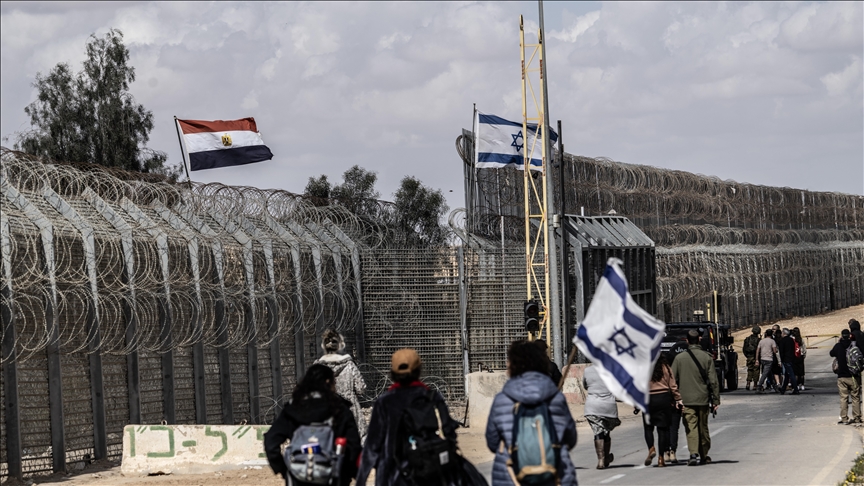Famine possibly under way in northern Gaza
despite recent aid efforts – report
Concerns over hunger in Gaza have risen since an expert said Gaza had entered ‘full-blown famine’ after months of war.
by Joe Connor
2024-06-05 
An independent group of experts has warned famine is possibly under way in northern Gaza but that the war between Israel and Hamas and restrictions on humanitarian access have impeded the data collection to prove it.
The group known as the Famine Early Warning Systems Network (Fews Net) said famine in Gaza “is possible, if not likely”.
Concerns about deadly hunger have been high in recent months and spiked after the head of the World Food Programme last month said northern Gaza had entered “full-blown famine” after nearly seven months of war. Experts at the UN agency later said Cindy McCain was expressing a personal opinion. Israeli soldiers work on a tank in a staging area near the Israeli-Gaza border in southern Israel (AP)
Israeli soldiers work on a tank in a staging area near the Israeli-Gaza border in southern Israel (AP)
An area is considered to be in famine when three things occur: 20% of households have an extreme lack of food, or are essentially starving; at least 30% of the children suffer from acute malnutrition or wasting, meaning they are too thin for their height; and two adults or four children per every 10,000 people are dying daily of hunger and its complications.
That is according to the Integrated Food Security Phase Classification, a collection of UN agencies, governments and other bodies that in March warned famine was imminent in northern Gaza.
Tuesday’s report by Fews Net is the first technical assessment by an international organisation saying that famine is possibly occurring in northern Gaza.
Funded by the United States Agency for International Development, Fews Net is an internationally recognised authority on famine that provides evidence-based and timely early warning information for food insecurity. Palestinians look at the destruction after an Israeli airstrike in Khan Younis (AP)
Palestinians look at the destruction after an Israeli airstrike in Khan Younis (AP)
It also helps inform decisions on humanitarian responses in some of the world’s most food insecure countries.
But for a formal declaration of famine, the data must be there.
Such a declaration could be used as evidence at the International Criminal Court as well as at the International Court of Justice, where Israel faces allegations of genocide.
The report cautioned that data collection would likely be impeded as long as the war goes on. It said people – including children – are dying of hunger-related causes across the territory and that those conditions will likely persist until at least July, if there is no fundamental change in how food aid is distributed.
The report also cautioned that efforts to increase aid into Gaza are insufficient, and urged Israel’s government to act urgently.
The UN and international aid agencies for months have said not enough food or other humanitarian supplies are entering Gaza, and Israel faces mounting pressure from top ally the US and others to let in more aid.
Israel has repeatedly denied there is famine under way in Gaza and rejected allegations it has used hunger as a weapon in its war against the militant Hamas group. It has opened a number of new crossings into Gaza in recent months, saying they helped increase the flow of aid.
But Israel has also been expanding its offensive in Gaza’s southern city of Rafah, once the main hub of humanitarian aid operations. That invasion has largely cut off the flow of food, medicine and other supplies to Palestinians facing hunger.
The Israeli military, which is responsible for the crossings into Gaza, did not immediately respond to a request for comment on the Fews Net report
Officials in Gaza, international organizations insist there is no alternative to opening all border crossings to combat humanitarian crisis in Gaza
Mohamed Majed and Ali Semerci | 02.06.2024

GAZA CITY, Palestine
After Israel’s announcement on Wednesday that it had taken control of the Philadelphi Corridor along the Palestine-Egypt border, the army blockade of all borders of the Gaza Strip was reinforced, and all aid entry points were captured.
This move severs Gaza's geographical connection with Egypt, enabling the Tel Aviv administration to obstruct or restrict the entry of humanitarian aid to Gaza. The region has been experiencing a major humanitarian crisis due to ongoing attacks since Oct. 7, 2023.
The most affected by this development are the 2.3 million Palestinians living in the Gaza Strip where people are already suffering from severe food, water, and medicine shortages due to Israel's restrictions, which violate international laws and the laws of war.
According to a statement from the Gaza government’s Media Office, 2.3 million Palestinians, including 2 million who have been displaced multiple times and rely on daily aid, need more than 7 million meals per day due to Israel’s "starvation" policy.
Additionally, fuel, medicine, and other vital necessities must be sent to the region to meet the needs of the displaced population.
However, Israel’s strict restrictions on aid entry and the closure of border crossings are deepening the humanitarian crisis in Palestine's besieged enclave.
Rafah border crossing seized
On May 7, the Israeli army launched a ground assault on Rafah in southern Gaza, where displaced Palestinians had taken refuge.
The army seized the Palestinian side of the Rafah Border Crossing between Gaza and Egypt, closing the crossings.
This situation made it impossible to deliver aid through Rafah or evacuate wounded people who needed treatment outside of Gaza.
Egypt declared that it would not accept "Israel's policy of fait accompli" and its imposition at the Rafah Border Crossing, and refused to coordinate with Israel.
Cairo blamed Tel Aviv for the border crossing closure and the potential consequences that would further escalate the crisis in Gaza.
Limited aid trucks enter Gaza
During a phone call on May 24, Egyptian President Abdel Fattah al-Sisi and his American counterpart Joe Biden agreed to temporarily deliver humanitarian aid to Gaza via the Karem Abu Salem border crossing, also known in Israel as Kerem Shalom.
However, since May 24, only a limited number of aid trucks have been able to enter Gaza through the Kerem Abu Salem Border Crossing due to Israel’s strict restrictions.
The Kerem Abu Salem Border Crossing has been closed to aid entry to Gaza since May 5. During May, the crossing was opened and closed twice, with only a few dozen commercial trucks entering.
Most Gazans, however, have no income source or the ability to purchase goods from the private sector due to ongoing attacks since Oct.7.
According to the Gaza government’s Media Office, only 215 aid trucks, including 109 loaded with flour and six with medicine, managed to enter Gaza last week through a point established by the Israeli army west of Beit Lahia.
The government media office in Gaza said on Sunday that the US-built temporary pier on the coast of Gaza delivered only 100 trucks of aid in a week since operations began.
The floating dock collapsed due to weather conditions and strong waves and the US estimates that repairs will take more than a week.
Officials in Gaza and international organizations insist that there is no alternative to opening all border crossings to combat the humanitarian crisis in Gaza. The government in Gaza stated that the US is trying to improve its “ugly image” with the pier.
Blockade ongoing for 18 Years
Israel’s capture of the Philadelphi Corridor, which completely blocks Gaza, strengthens the blockade that has been in place for 18 years.
After Hamas won the parliamentary elections in 2006 and took control of the Gaza Strip, Israel began imposing a blockade on Gaza, which was tightened in 2007.
Israel's blockade of Gaza includes the closure of four border crossings: Karni, Nahal Oz, Kerem Ebu Salim, and Sufa.
The Beit Hanoun Border Crossing was designated for individual entry and exit, while the Kerem Abu Salem Border Crossing was reserved for commercial goods, with both crossings open and closed on a limited basis.
Despite increasing international calls for a resolution to the humanitarian crisis in Gaza and the International Court of Justice’s ruling to halt attacks on Rafah, Israel has tightened its siege on the Gaza Strip by controlling the Philadelphi Corridor.
According to Sam Rose, director of planning for the UN agency for Palestinian refugees (UNRWA), humanitarian aid is only a few kilometers from Gaza's border, but Palestinians are on the verge of famine.
Rose highlighted the difficulties encountered in delivering aid to Gaza due to restrictions and arbitrary inspections imposed by Israeli authorities, calling the international community to put pressure on Israel to allow aid trucks to enter Gaza through known borders such as Rafah and Kerem Abu Salem, as well as to reopen the al-Mintar, al-Shuja'iya, and Beit Hanoun borders.
*Writing by Seda Sevencan
No comments:
Post a Comment